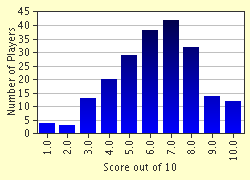Quiz Answer Key and Fun Facts
1. The first exploration into the New World was certainly a multinational effort; navigators traditionally came from the Italian states and were hired by other nations. Which of the following does *not* match correctly an exploring nation with its primary motives before 1600?
2. Although the decline of Spanish naval supremacy was a gradual process, it can be exemplified by the defeat of the armada in 1588. This defeat foreshadowed the naval ascendency of which other nation?
3. The War of the Spanish Succession, the War of the Austrian Succession, and the Seven Years' War all occurred during the 18th century. Which country was the definitive winner in all of them?
4. The Seven Years' War has been called the first "world war." Why is this?
5. The new political thinking emerging in Europe and its colonies during the late 18th century favored which of the following?
6. In the first decade of the 19th century, power rapidly concentrated on mainland Europe in the hands of which nation?
7. In the Congress of Vienna in 1815, European nations sought to do what?
8. Noticeable reactions against the Congress of Vienna were most prevalent in what year?
9. The greatest alteration of the balance of power occurred with what event?
10. Which of the following was NOT a major cause of World War I?
Source: Author
op47b
This quiz was reviewed by FunTrivia editor
bloomsby before going online.
Any errors found in FunTrivia content are routinely corrected through our feedback system.

